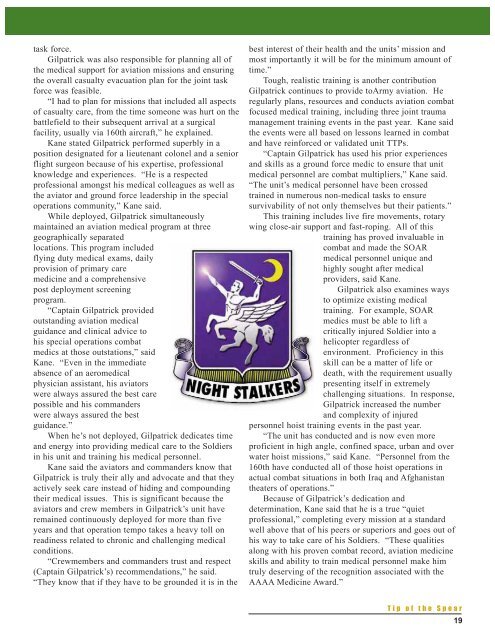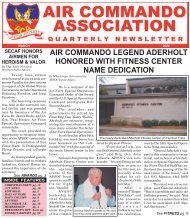tip of the spear (pdf) - The Air Commando Association
tip of the spear (pdf) - The Air Commando Association
tip of the spear (pdf) - The Air Commando Association
You also want an ePaper? Increase the reach of your titles
YUMPU automatically turns print PDFs into web optimized ePapers that Google loves.
task force.<br />
Gilpatrick was also responsible for planning all <strong>of</strong><br />
<strong>the</strong> medical support for aviation missions and ensuring<br />
<strong>the</strong> overall casualty evacuation plan for <strong>the</strong> joint task<br />
force was feasible.<br />
“I had to plan for missions that included all aspects<br />
<strong>of</strong> casualty care, from <strong>the</strong> time someone was hurt on <strong>the</strong><br />
battlefield to <strong>the</strong>ir subsequent arrival at a surgical<br />
facility, usually via 160th aircraft,” he explained.<br />
Kane stated Gilpatrick performed superbly in a<br />
position designated for a lieutenant colonel and a senior<br />
flight surgeon because <strong>of</strong> his expertise, pr<strong>of</strong>essional<br />
knowledge and experiences. “He is a respected<br />
pr<strong>of</strong>essional amongst his medical colleagues as well as<br />
<strong>the</strong> aviator and ground force leadership in <strong>the</strong> special<br />
operations community,” Kane said.<br />
While deployed, Gilpatrick simultaneously<br />
maintained an aviation medical program at three<br />
geographically separated<br />
locations. This program included<br />
flying duty medical exams, daily<br />
provision <strong>of</strong> primary care<br />
medicine and a comprehensive<br />
post deployment screening<br />
program.<br />
“Captain Gilpatrick provided<br />
outstanding aviation medical<br />
guidance and clinical advice to<br />
his special operations combat<br />
medics at those outstations,” said<br />
Kane. “Even in <strong>the</strong> immediate<br />
absence <strong>of</strong> an aeromedical<br />
physician assistant, his aviators<br />
were always assured <strong>the</strong> best care<br />
possible and his commanders<br />
were always assured <strong>the</strong> best<br />
guidance.”<br />
When he’s not deployed, Gilpatrick dedicates time<br />
and energy into providing medical care to <strong>the</strong> Soldiers<br />
in his unit and training his medical personnel.<br />
Kane said <strong>the</strong> aviators and commanders know that<br />
Gilpatrick is truly <strong>the</strong>ir ally and advocate and that <strong>the</strong>y<br />
actively seek care instead <strong>of</strong> hiding and compounding<br />
<strong>the</strong>ir medical issues. This is significant because <strong>the</strong><br />
aviators and crew members in Gilpatrick’s unit have<br />
remained continuously deployed for more than five<br />
years and that operation tempo takes a heavy toll on<br />
readiness related to chronic and challenging medical<br />
conditions.<br />
“Crewmembers and commanders trust and respect<br />
(Captain Gilpatrick’s) recommendations,” he said.<br />
“<strong>The</strong>y know that if <strong>the</strong>y have to be grounded it is in <strong>the</strong><br />
best interest <strong>of</strong> <strong>the</strong>ir health and <strong>the</strong> units’ mission and<br />
most importantly it will be for <strong>the</strong> minimum amount <strong>of</strong><br />
time.”<br />
Tough, realistic training is ano<strong>the</strong>r contribution<br />
Gilpatrick continues to provide toArmy aviation. He<br />
regularly plans, resources and conducts aviation combat<br />
focused medical training, including three joint trauma<br />
management training events in <strong>the</strong> past year. Kane said<br />
<strong>the</strong> events were all based on lessons learned in combat<br />
and have reinforced or validated unit TTPs.<br />
“Captain Gilpatrick has used his prior experiences<br />
and skills as a ground force medic to ensure that unit<br />
medical personnel are combat mul<strong>tip</strong>liers,” Kane said.<br />
“<strong>The</strong> unit’s medical personnel have been crossed<br />
trained in numerous non-medical tasks to ensure<br />
survivability <strong>of</strong> not only <strong>the</strong>mselves but <strong>the</strong>ir patients.”<br />
This training includes live fire movements, rotary<br />
wing close-air support and fast-roping. All <strong>of</strong> this<br />
training has proved invaluable in<br />
combat and made <strong>the</strong> SOAR<br />
medical personnel unique and<br />
highly sought after medical<br />
providers, said Kane.<br />
Gilpatrick also examines ways<br />
to optimize existing medical<br />
training. For example, SOAR<br />
medics must be able to lift a<br />
critically injured Soldier into a<br />
helicopter regardless <strong>of</strong><br />
environment. Pr<strong>of</strong>iciency in this<br />
skill can be a matter <strong>of</strong> life or<br />
death, with <strong>the</strong> requirement usually<br />
presenting itself in extremely<br />
challenging situations. In response,<br />
Gilpatrick increased <strong>the</strong> number<br />
and complexity <strong>of</strong> injured<br />
personnel hoist training events in <strong>the</strong> past year.<br />
“<strong>The</strong> unit has conducted and is now even more<br />
pr<strong>of</strong>icient in high angle, confined space, urban and over<br />
water hoist missions,” said Kane. “Personnel from <strong>the</strong><br />
160th have conducted all <strong>of</strong> those hoist operations in<br />
actual combat situations in both Iraq and Afghanistan<br />
<strong>the</strong>aters <strong>of</strong> operations.”<br />
Because <strong>of</strong> Gilpatrick’s dedication and<br />
determination, Kane said that he is a true “quiet<br />
pr<strong>of</strong>essional,” completing every mission at a standard<br />
well above that <strong>of</strong> his peers or superiors and goes out <strong>of</strong><br />
his way to take care <strong>of</strong> his Soldiers. “<strong>The</strong>se qualities<br />
along with his proven combat record, aviation medicine<br />
skills and ability to train medical personnel make him<br />
truly deserving <strong>of</strong> <strong>the</strong> recognition associated with <strong>the</strong><br />
AAAA Medicine Award.”<br />
Tip <strong>of</strong> <strong>the</strong> Spear<br />
19



